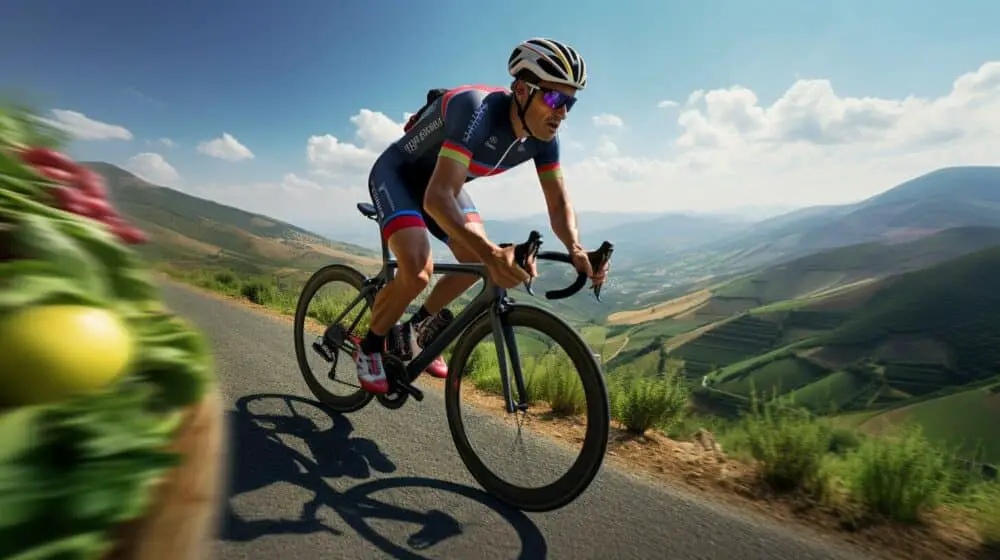As a professional road cyclist, I’ve learned firsthand the importance of proper nutrition in maximizing performance. A well-balanced cycling nutrition plan is essential in fueling the body and replenishing muscle glycogen. In this article, I’ll explore the ins and outs of road cycling diet plans and provide insights on how to optimize your nutrition for top performance.
Key Takeaways:
- Proper nutrition is crucial in maximizing cycling performance
- A cycling nutrition plan should focus on fueling the body and replenishing muscle glycogen
- Carbohydrates play a crucial role in fueling road cycling, and protein is vital in supporting muscle recovery and growth
- Choosing nutrient-dense whole foods over processed alternatives is important
- Pre-ride nutrition strategies, including carb loading, can ensure optimal glycogen stores and prevent glycogen depletion during rides
The Role of Nutrition in Cycling Performance
As a passionate cyclist, I know that proper nutrition is essential in achieving peak performance. Eating the right foods can help maintain glycogen stores, which our bodies rely on as a primary source of energy during cycling. In this section, I’ll share some insights on the importance of cycling nutrition, glycogen stores, and the benefits of a high carbohydrate diet.
Cycling Nutrition: Consuming a diet that comprises all necessary nutrients is integral to every cyclist’s performance. Our bodies need a balanced intake of carbohydrates, protein, and fats to sustain muscle energy, allow for proper recovery, and achieve optimal performance. A cyclist’s diet should have a high carbohydrate content, so the body can maintain glycogen stores and utilize this energy source while on rides.
Glycogen Stores: Glycogen is the stored form of carbohydrates in our muscles and liver. Glycogen stores are essential to sustain prolonged and intense physical exertion, like during cycling. A cyclist must consume enough carbohydrates to maintain their glycogen stores and ensure optimal performance. Low glycogen levels lead to fatigue, making it challenging to complete long rides.
High Carbohydrate Diet: A high carbohydrate diet can help maintain glycogen levels and improve endurance during rides. Cyclists need to consume enough carbohydrates, such as oatmeal, sweet potatoes, or whole-grain bread, to maintain their glycogen stores without having to worry about the risk of glycogen depletion during long rides.
In conclusion, proper nutrition plays a key role in cycling performance. Eating a high carbohydrate diet is crucial in maintaining glycogen stores that our bodies rely on during physical exertion, such as cycling. In the next section, I will dive into how to incorporate carbohydrates into our diets to fuel our rides optimally.
Fueling Your Rides: Carbohydrate Intake
Carbohydrates are an essential macronutrient for road cyclists. They provide the body with the energy it needs to power through long, rigorous rides. As a general rule, cyclists should aim to consume around 3-5 grams of carbohydrates per pound of body weight per day, with an emphasis on complex carbohydrates that are slowly digested and provide sustained energy.
Some great options for incorporating complex carbohydrates into your diet include sweet potatoes, whole grain pasta, and brown rice. Energy bars are also a convenient option for fueling your rides, but be sure to choose bars that are high in complex carbohydrates and low in added sugar.
It’s important to note that not all carbohydrates are created equal. Simple carbohydrates, such as those found in candy and soda, provide a quick burst of energy but are quickly depleted, leading to a crash. In contrast, complex carbohydrates are digested more slowly, providing sustained energy for longer periods of time.
If you’re planning a long ride, consider carb-loading in the days leading up to it. This involves increasing your carbohydrate intake in order to maximize your muscle glycogen stores, which can prevent premature fatigue during your ride. Good carb-loading options include whole grain bread, oatmeal, and quinoa.
Enhancing Recovery: Post-Ride Cycling Nutrition
Proper post-ride nutrition is essential for faster recovery and muscle glycogen replenishment. It’s important to fuel your body with the right nutrients after a ride to ensure you’re ready for the next one. Here are some tips to help you optimize your post-ride cycling nutrition:
- Include whole foods in your post-ride meal: Whole foods are nutrient-dense and help your body recover faster. Options include a mix of lean protein, healthy fats, and complex carbs. Try grilled salmon with sweet potato wedges and a side of leafy greens for a balanced post-ride meal.
- Add healthy fats: Adding healthy fats to your post-ride meal can help reduce inflammation and speed up recovery. Olive oil is an excellent source of healthy fats that can be added to your meals.
- Replenish muscle glycogen: Your muscles use glycogen as a source of energy during rides. Consuming carbohydrates after a ride helps replenish muscle glycogen. Try having a banana, or an energy bar with complex carbs.
It’s important to keep in mind that liquid calories are not as filling as whole foods, so it’s best to consume them in addition to regular meals. While it may be tempting to reach for a sports drink or protein shake after a ride, it’s better to focus on getting nutrients from whole foods whenever possible.
Finding the Right Balance: Protein and Muscle Mass
Incorporating protein-rich foods into your cycling diet is crucial for maintaining muscle mass and promoting recovery. Consuming adequate protein helps repair damaged muscle fibers and supports the growth of new ones, ensuring that your body can keep up with the demands of regular cycling. Here are some protein-rich options to consider:
| Food | Protein Content |
|---|---|
| Grilled chicken breast | 25 grams per 3 oz serving |
| Greek yogurt | 18 grams per 6 oz serving |
| Black beans | 21 grams per 1 cup serving |
| Quinoa | 8 grams per 1 cup serving |
It’s important to note that protein should be consumed in moderation and balanced with carbohydrates and healthy fats to ensure a well-rounded diet. Consult with a registered dietitian if you have concerns about meeting your protein needs while maintaining a healthy cycling diet.
Striking a Balance: Power to Weight Ratio
As a road cyclist, achieving a healthy power-to-weight ratio is crucial to optimizing performance. This balance between muscle mass and weight can significantly impact your cycling abilities, especially when climbing hills or participating in racing events.
One key strategy for achieving this balance is by burning fat while preserving muscle mass through proper nutrition. While weight loss may be a goal for some, it’s essential to maintain sufficient muscle mass to avoid negative impacts on cycling performance.
Incorporating protein-rich foods such as fish, chicken, and legumes into your diet can help support muscle recovery and growth. However, it’s crucial to strike a balance and not over-consume protein, which can lead to excess bodyweight and hinder performance.
Additionally, focusing on nutrient-dense foods and avoiding processed alternatives can aid in weight loss while still providing necessary fuel for cycling. Olive oil and complex carbohydrates such as sweet potatoes can also support a healthy power-to-weight ratio while providing essential nutrients for optimal cycling performance.
The Importance of Whole Foods: Nutrient Dense Choices
As a road cyclist, your nutrition plan should focus on fueling your rides, aiding in recovery, and supporting muscle growth. To achieve these goals, you need to choose the right foods, and whole foods should be at the top of your list.
Whole foods are nutrient-dense and unprocessed, meaning they provide a wide range of nutrients without added chemicals or preservatives. These foods should form the foundation of your cycling nutrition plan, allowing you to get the nutrients you need to ride harder and longer while maintaining good health.
The Benefits of Whole Foods for Road Cyclists
Choosing nutrient-dense foods like whole grains, fruits, and vegetables can help to improve your cycling performance in several ways. These foods are rich in vitamins, minerals, and antioxidants that promote overall health and wellbeing. They can also help to:
- Boost energy levels
- Improve muscle function and recovery
- Reduce inflammation and promote healing
- Lower the risk of chronic diseases like heart disease, diabetes, and cancer
When it comes to fueling your rides, whole foods provide a steady source of energy that lasts longer than processed alternatives. This means you can ride harder and longer without feeling fatigue or hitting the dreaded “bonk.”
Incorporating Whole Foods into Your Cycling Diet Plan
The best way to incorporate whole foods into your cycling nutrition plan is to focus on variety and balance. Aim to include a wide range of fruits, vegetables, whole grains, lean proteins, and healthy fats in your meals and snacks.
Some excellent choices for nutrient-dense whole foods include:
| Food | Nutrients |
|---|---|
| Sweet potatoes | Complex carbohydrates, beta-carotene, vitamin C |
| Almonds | Healthy fats, protein, magnesium |
| Salmon | Omega-3 fatty acids, protein, B vitamins |
| Kale | Vitamin K, vitamin C, iron, antioxidants |
By eating a variety of whole foods, you can get the nutrients you need to support your cycling performance and overall health.
In Summary
Choosing nutrient-dense whole foods is key to optimizing your cycling nutrition plan. These foods provide a wide range of nutrients that support your overall health and wellbeing, while also fueling your rides and promoting faster recovery. By incorporating a variety of whole foods into your diet, you can ensure that you’re getting the nutrients you need to perform your best on the road.
Fuel on the Go: Energy Gels and Bars
During a training session, it can be challenging to fuel your body sufficiently without interfering with your ride. That’s where energy gels and bars come in – convenient and easy-to-consume sources of energy that can help you maintain your cycling nutrition plan while on the go.
Energy gels are easy to carry and consume, providing a quick boost of energy during intense rides. They typically contain around 20-30 grams of carbohydrates per serving, which can help maintain glycogen levels and fuel your muscles throughout the ride. Energy bars are also a handy option during longer rides, as they provide more sustained energy and can help you feel full for longer periods. Look for bars rich in complex carbohydrates to ensure a steady release of energy.
It’s important to remember that energy gels and bars should not replace real food in your diet. They should only be used as a supplement during intense or long rides when convenient fueling options are necessary. Additionally, it’s vital to stay hydrated during a training session, especially when using energy gels or bars.
When incorporating energy gels and bars into your cycling nutrition plan, consider the timing. For instance, if you plan to use an energy gel during a ride, consume it 10-15 minutes before the energy boost is required. Similarly, if using energy bars, consume them in small bites spread out over a few minutes, rather than in one go.
Overall, energy gels and bars can be excellent additions to your cycling nutrition plan during training sessions, provided you use them wisely and in conjunction with a well-rounded diet.
Planning for Success: Pre-Ride Nutrition and Carb Loading
As a road cyclist, I know the importance of pre-ride nutrition and carb loading in maximizing performance. Adequately fueling your body before a ride can help prevent glycogen depletion, and keep you energized throughout the ride. Here are some tips on how to plan your nutrition pre-ride:
Timing is Key
It’s important to time your pre-ride meal or snack correctly. The goal is to consume carbohydrates that will convert to glycogen in the muscles, providing energy during the ride. Eating too close to the ride can lead to indigestion or cramping, while eating too early may leave you feeling hungry mid-ride. I recommend consuming a meal or snack containing carbohydrates 2-3 hours before the ride.
Food Choices
Choosing the right pre-ride food is crucial. Carbohydrate-rich foods like oatmeal, bananas, and bread are excellent choices. Carbs can be easily broken down into glycogen to fuel your muscles. Avoid heavy, high-fat meals or snacks, which can slow digestion and cause discomfort during the ride.
Carb Loading
Carb loading is a strategy used by athletes to increase glycogen stores before a big event. It involves consuming a higher amount of carbohydrates in the days leading up to the event. Carb loading can be beneficial for longer rides or races. However, it’s essential to experiment and find out what works best for your body.
Hydration
Don’t forget to hydrate before your ride. Dehydration can lead to fatigue and decreased performance. Aim to drink at least 16 ounces of water a few hours before your ride, and continue to hydrate during the ride.
By following a proper pre-ride nutrition plan, you can maximize your performance and prevent glycogen depletion. Plan ahead, experiment with different food choices, and stay hydrated for a successful and enjoyable ride.
Conclusion
In conclusion, following a well-balanced cycling diet plan is crucial for maximizing your performance on the road. Not only can it help you maintain optimal glycogen stores, but it can also lead to weight loss and overall better health. Remember to incorporate all the essential food groups, including nutrient-dense whole foods and protein-rich options, while also paying attention to carbohydrate intake and post-ride nutrition for muscle recovery and glycogen replenishment.
If you’re looking to enhance your cycling performance, consider incorporating carb loading and convenient fueling options like energy gels and bars during your training sessions. And always prioritize real, unprocessed foods over processed alternatives.
With the right cycling nutrition plan in place, you can fuel your rides and achieve your goals on the road. So, take the time to plan your meals, make healthy food choices, and enjoy the ride.
FAQ
Q: What are road cycling diet plans?
A: Road cycling diet plans are specifically designed meal plans that prioritize proper nutrition to support and maximize cycling performance. These plans focus on fueling the body with the right nutrients, replenishing muscle glycogen, and maintaining a healthy weight.
Q: Why is nutrition important for cycling performance?
A: Nutrition plays a crucial role in optimizing cycling performance. It ensures that the body has enough energy to sustain long rides by maintaining glycogen stores through a high carbohydrate diet. Proper nutrition also supports muscle recovery and growth, enhances post-ride recovery, and aids in maintaining a healthy weight and power-to-weight ratio.
Q: How can I incorporate carbohydrates into my cycling diet?
A: Carbohydrates are a key fuel source for road cycling. You can incorporate carbohydrates into your diet by consuming energy bars, whole grains, fruits, and vegetables. Complex carbohydrates like sweet potatoes are also a great option. Aim to include carbohydrates in your pre-ride meals and during long rides to keep your energy levels up.
Q: What should I eat after a ride to enhance recovery?
A: Post-ride nutrition is essential for faster recovery and muscle glycogen replenishment. Focus on consuming whole foods rich in nutrients, such as lean proteins, fruits, vegetables, and healthy fats like olive oil. These foods will provide the necessary nutrients to support muscle repair and replenish glycogen stores.
Q: How does protein support muscle mass for cyclists?
A: Protein is crucial for muscle recovery and growth. Incorporate protein-rich foods into your cycling diet, such as lean meats, fish, eggs, Greek yogurt, and plant-based protein sources like legumes and tofu. Consuming an adequate amount of protein will help maintain and build muscle mass, supporting your cycling performance.
Q: Why is maintaining a healthy weight important for cycling performance?
A: Maintaining a healthy weight is important for optimizing cycling performance. A healthy weight contributes to a favorable power-to-weight ratio, allowing you to generate more power while pedaling. By burning fat and preserving muscle mass through proper nutrition, you can improve your cycling performance and overall efficiency.
Q: What are nutrient-dense whole foods?
A: Nutrient-dense whole foods are foods that are rich in essential nutrients while being relatively low in calories. These include fruits, vegetables, whole grains, lean proteins, and healthy fats. Prioritizing these foods in your cycling nutrition plan ensures that you are getting the maximum amount of nutrients and supporting your overall health and performance.
Q: How do energy gels and bars help during cycling training sessions?
A: Energy gels and bars are convenient fueling options during cycling training sessions. They provide easily digestible carbohydrates and sometimes electrolytes to help maintain energy levels and prevent fatigue during long rides. It’s important to use them strategically, following the recommended consumption guidelines, and experimenting with different flavors and brands to find what works best for you.
Q: What should I eat before a ride to maximize performance?
A: Pre-ride nutrition is crucial for optimal performance. Consider incorporating carb loading strategies, such as consuming high-carbohydrate meals and snacks in the days leading up to a long ride or event. Focus on easily digestible foods like fruits, whole grains, and lean proteins. Timing your meals and snacks to allow for proper digestion is also important to prevent discomfort during your ride.
Q: Why is following a well-balanced cycling diet plan important?
A: Following a well-balanced cycling diet plan is important for maximizing performance and overall health. It ensures that you are fueling your body with the right nutrients, supporting muscle recovery and growth, replenishing glycogen stores, and maintaining a healthy weight. Incorporating all the essential food groups, including carbohydrates, proteins, fruits, vegetables, and healthy fats, provides a well-rounded approach to nutrition for cyclists.




